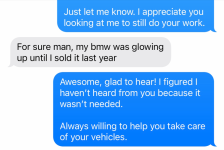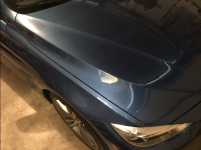Marlboroman
Site Sponsor
- Apr 30, 2021
- 138
- 208
Morning Fellow Dune Ratz,
My crew and I were talking the other day about the recent increase in home based "mechanics".
I wanted to open up a discussion about a topic that seems to be gaining traction lately: home-based vehicle repair shops. With many mechanics operating out of their garages and often without the necessary permits or insurance, I’m curious to hear your thoughts and experiences regarding this trend.
Do any of you currently use home-based mechanics for your vehicle repairs? If so, what influenced your decision? Was it the price point, convenience, or perhaps a recommendation from a friend?
Additionally, I’d love to get your perspectives on some important issues: How do you feel about the lack of insurance and liability coverage that these home shops often have? Does it concern you that they may not be contributing taxes, potentially putting legitimate businesses at a disadvantage?
Finally, when choosing a repair shop, do you prioritize the legitimacy and reliability of the business, or is the cost the only factor that matters to you?
I’m looking forward to hearing your thoughts and hopefully sparking a constructive conversation about the impact of these home-based operations on our industry.
Some Examples:
**Zoning Violations and Unfair Competition**
Many home mechanics run their businesses in residential areas without the necessary permits or adherence to zoning regulations. This not only poses safety and liability concerns but also creates an uneven playing field. Legitimate businesses invest in their facilities, comply with local laws, and pay necessary taxes. In contrast, these home-based operations often skirt these responsibilities, allowing them to offer lower prices that undercut established shops.
**Tax Evasion and Insurance Gaps**
One of the most concerning aspects is the lack of tax contributions from these home mechanics. By not registering their businesses, they avoid paying sales tax and business taxes, which places a heavier burden on those of us who do comply with regulations. Moreover, many lack proper insurance, which puts customers at risk. If something goes wrong, the liability falls solely on the consumer, unlike in regulated shops where proper protections are in place.
**Market Disruption**
The presence of these unregulated mechanics is disrupting the market. Customers attracted by lower prices may not realize they are sacrificing quality and safety. This can lead to a cycle of poor repairs and dissatisfaction, further driving customers away from legitimate businesses that prioritize quality and service. Over time, this could lead to a devaluation of the repair industry as a whole, where quality workmanship is overshadowed by unsustainable pricing models.
**Conclusion**
While I respect the entrepreneurial spirit, we need to address the implications of allowing home-based mechanics to operate without oversight. It is essential for our industry to advocate for fair competition, uphold safety standards, and ensure that all businesses contribute to the community through taxes and compliance. I invite everyone to share their thoughts and experiences on this issue so we can work together to find solutions that benefit the entire off-road vehicle repair industry.
Thank you for your time!
My crew and I were talking the other day about the recent increase in home based "mechanics".
I wanted to open up a discussion about a topic that seems to be gaining traction lately: home-based vehicle repair shops. With many mechanics operating out of their garages and often without the necessary permits or insurance, I’m curious to hear your thoughts and experiences regarding this trend.
Do any of you currently use home-based mechanics for your vehicle repairs? If so, what influenced your decision? Was it the price point, convenience, or perhaps a recommendation from a friend?
Additionally, I’d love to get your perspectives on some important issues: How do you feel about the lack of insurance and liability coverage that these home shops often have? Does it concern you that they may not be contributing taxes, potentially putting legitimate businesses at a disadvantage?
Finally, when choosing a repair shop, do you prioritize the legitimacy and reliability of the business, or is the cost the only factor that matters to you?
I’m looking forward to hearing your thoughts and hopefully sparking a constructive conversation about the impact of these home-based operations on our industry.
Some Examples:
**Zoning Violations and Unfair Competition**
Many home mechanics run their businesses in residential areas without the necessary permits or adherence to zoning regulations. This not only poses safety and liability concerns but also creates an uneven playing field. Legitimate businesses invest in their facilities, comply with local laws, and pay necessary taxes. In contrast, these home-based operations often skirt these responsibilities, allowing them to offer lower prices that undercut established shops.
**Tax Evasion and Insurance Gaps**
One of the most concerning aspects is the lack of tax contributions from these home mechanics. By not registering their businesses, they avoid paying sales tax and business taxes, which places a heavier burden on those of us who do comply with regulations. Moreover, many lack proper insurance, which puts customers at risk. If something goes wrong, the liability falls solely on the consumer, unlike in regulated shops where proper protections are in place.
**Market Disruption**
The presence of these unregulated mechanics is disrupting the market. Customers attracted by lower prices may not realize they are sacrificing quality and safety. This can lead to a cycle of poor repairs and dissatisfaction, further driving customers away from legitimate businesses that prioritize quality and service. Over time, this could lead to a devaluation of the repair industry as a whole, where quality workmanship is overshadowed by unsustainable pricing models.
**Conclusion**
While I respect the entrepreneurial spirit, we need to address the implications of allowing home-based mechanics to operate without oversight. It is essential for our industry to advocate for fair competition, uphold safety standards, and ensure that all businesses contribute to the community through taxes and compliance. I invite everyone to share their thoughts and experiences on this issue so we can work together to find solutions that benefit the entire off-road vehicle repair industry.
Thank you for your time!






